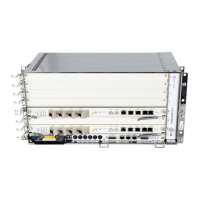FD 100/320Gbps NT and FX NT IHub Services Guide Virtual Private Routed Network Service
Issue: 13 3HH-11985-AAAA-TQZZA 513
7.10.9.27 loop-detect
Table 524 loop-detect command
Description This command enables setting the BGP local-preference attribute in incoming routes if not
specified and configures the default value for the attribute. This value is used if the BGP route
arrives from a BGP peer without the local-preference integer set.
The specified value can be overridden by any value set via a route policy. This configuration
parameter can be set at three levels: global level (applies to all peers), group level (applies to
all peers in peer-group) or neighbor level (only applies to specified peer). The most specific
value is used.
The no form of the command at the global level specifies that incoming routes with
local-preference set are not overridden and routes arriving without local-preference set are
interpreted as if the route had local-preference value of 100.
The no form of the command used at the group level reverts to the value defined at the global
level.
The no form of the command used at the neighbor level reverts to the value defined at the
group level.
Default no local-preference — Does not override the local-preference value set in arriving routes and
analyze routes without local preference with value of 100.
Parameters local-preference — The local preference value to be used as the override value, expressed as
a decimal integer.
Values: 0 — 4294967295
Item Description
(2 of 2)
Item Description
Syntax loop-detect {drop-peer | discard-route | ignore-loop| off}
no loop-detect
Context configure>service>vprn>bgp
configure>service>vprn>bgp>group
configure>service>vprn>bgp>group>neighbor
Description This command configures how the BGP peer session handles loop detection in the AS path.
This configuration parameter can be set at three levels: global level (applies to all peers), group
level (applies to all peers in peer-group) or neighbor level (only applies to specified peer). The
most specific value is used.
Note that dynamic configuration changes of loop-detect are not recognized.
The no form of the command used at the global level reverts to default, which is loop-detect
ignore-loop.
The no form of the command used at the group level reverts to the value defined at the global
level.
The no form of the command used at the neighbor level reverts to the value defined at the
group level.
Default loop-detect ignore-loop
(1 of 2)
